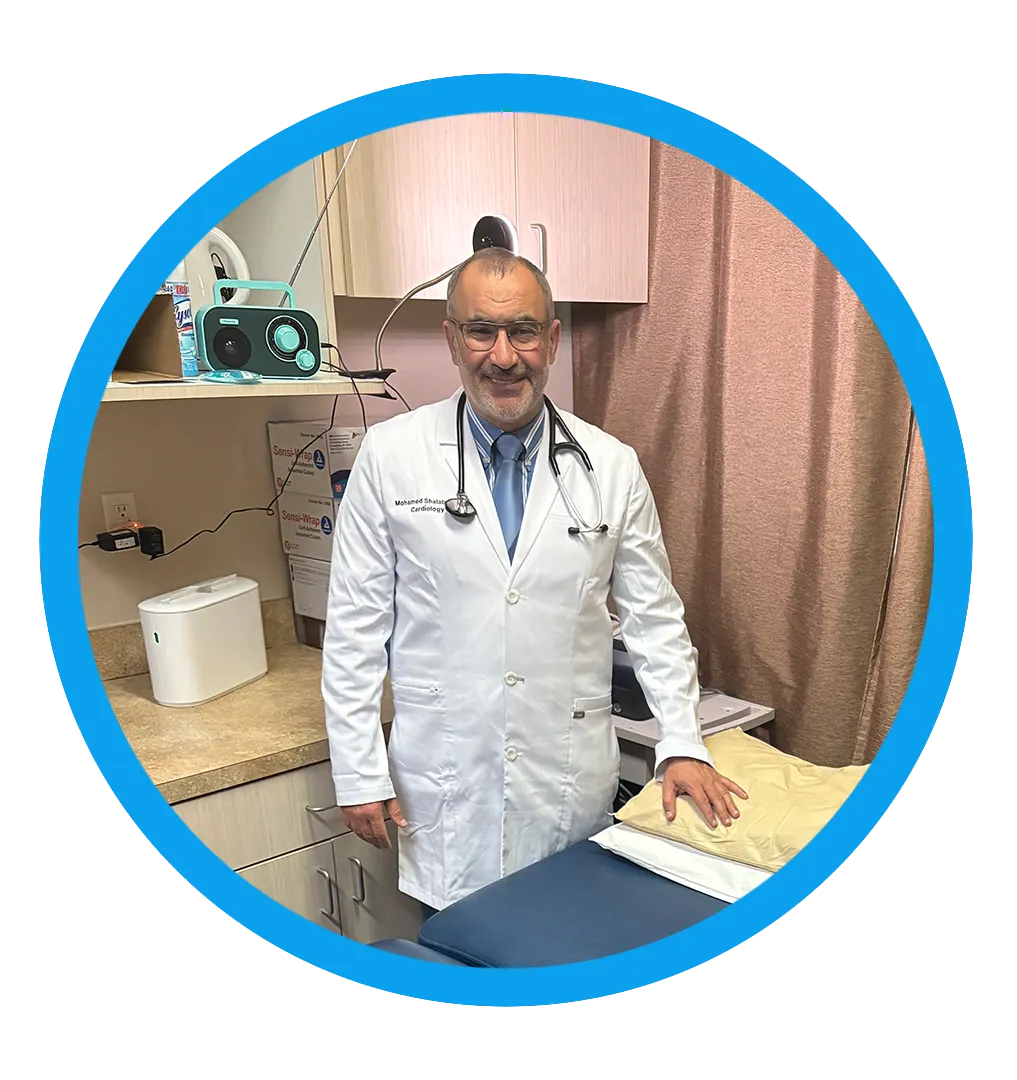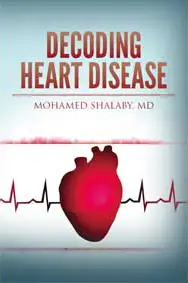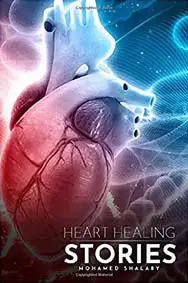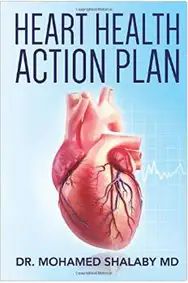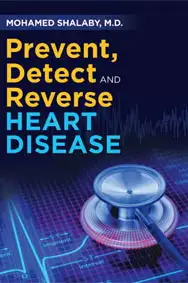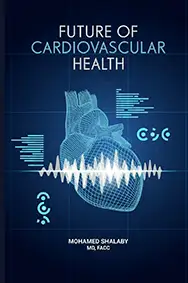Insurance Taken By Cardiologist Dr Shalaby
Self-Pay and Walk-Ins Are Welcome!
Aetna
Aetna Medicare
Ambetter
BCBS Federal
BCBS PPO
BCBS HMO
BCBS of Texas
UMR
United healthcare choice
UHC PPO
Tricare West
Wellcare
Wellmed
Dr. Shalaby now offers secure telemedicine cardiac evaluations for new and existing patients, allowing you to have a video visit using any device, with appointments covered by insurance or available for a cash fee.
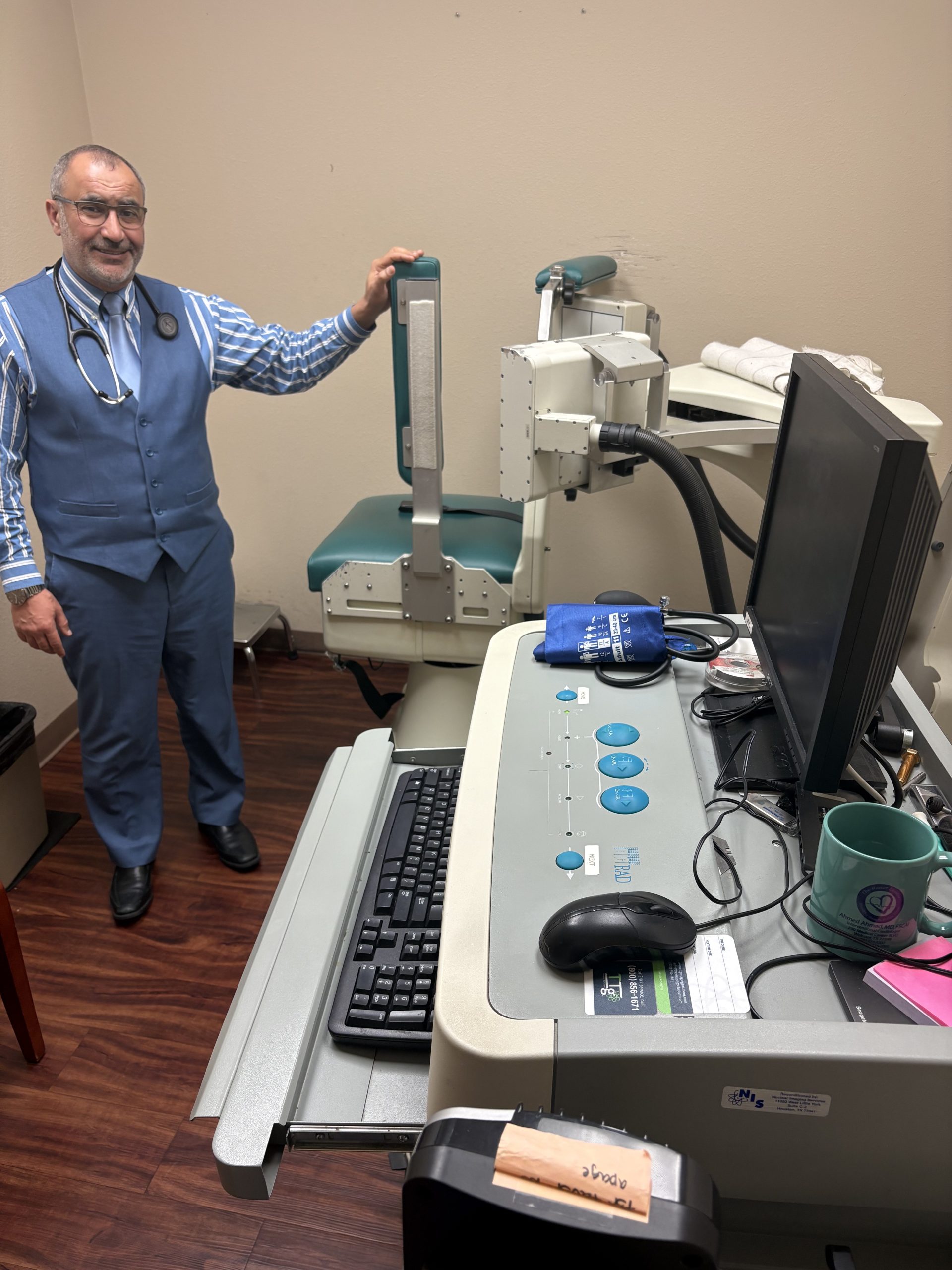
Why Choose Cardiologist Dr Shalaby For Heart Stress Test Echocardiography / Echocardiographer?
Dr Shalaby’s practice spans a wide scope of cardiovascular medicine with a special interest in new technologies in cardiac imaging, particularly heart stress test, echocardiography / echocardiographer, cardiac CT, cardiac MRI, and echocardiography. His expertise extends to peripheral vascular disease diagnosis and management, especially acute problems like chest pain and difficulty in breathing. As a skilled echocardiographer, he utilizes these advanced imaging techniques for comprehensive cardiac evaluations.
His extensive experience in early detection of cardiac disease and preventive cardiology, especially in managing symptoms like chest ache and dyspnea, allows him to architect various cardiac wellness and preventive programs. These utilize education, diet, exercise, behavioral therapy, and lifestyle modifications to deter and mitigate the severity of heart disease. Dr Shalaby often employs heart stress tests as part of his diagnostic toolkit.
Dr Shalaby’s work in early detection, weight reduction, and fitness programs, particularly for patients experiencing chest or heart ache or shortness of breath, is saving lives and transforming the lives of many of his patients and friends.
As an ardent professional, Dr Shalaby is a staff cardiologist at several esteemed institutions, including the Texas Heart Institute, the St. Luke Hospital, Clear Lake Regional Medical Center, Memorial South East Hospital, St. John Hospital, and the Mainland Medical Center. He frequently lectures at the local and national level on the early detection of heart disease, weight loss and cardiac disease, exercise and wellness programs, and a broad array of cardiac health-related topics, including the importance of heart stress tests and echocardiography in cardiac care.

Dr Mohamed Shalaby, Cardiologist on Great Day Houston: Prevention and Early Detection
Many people are unaware they have heart disease until it’s too late.
Cardiovascular disease affects various parts of the vascular system, with heart attacks and strokes being the most common manifestations.
Plaque buildup begins in the second decade of life and progresses based on lifestyle factors.
About 80% of heart disease deaths could be prevented through lifestyle modifications.
Symptoms can vary, with only 50% presenting typical angina symptoms.
Risk factors include family history, diabetes, hypertension, high cholesterol, inactivity, stress, and smoking.
New technologies, heart stress test, echocardiography / echocardiographer and lab work can help identify at-risk individuals who don’t have traditional risk factors.
Preventive measures include low-dose aspirin (with medical advice), controlling blood pressure and cholesterol, and lifestyle changes.
Advanced detection methods like IMT (Intima-Media Thickness) can assess vascular age and plaque buildup non-invasively.
Dr Shalaby emphasizes the importance of early detection, lifestyle modifications, and working with healthcare professionals to prevent and manage heart disease effectively.
Books by Cardiologist Dr Shalaby Relating to Heart Stress Test, Echocardiography, Echocardiographer Services
Heart Stress Test, Echocardiography, Echocardiographer Services>
Treadmill Excercise Stress Test
The Treadmill Exercise Stress Test allows us to evaluate how your heart performs during activity. Attached to a heart monitor we evaluate your vital signs and heart rhythm while you walk on a treadmill.
Nuclear Stress Test
The Nuclear Stress test allows us to view special images of your heart muscle during times of rest as well as exercise or activity. Following an injection of a radioactive substance, which poses no harm to your body, images of your heart both at rest and following exercise are taken with a special camera. Special medications can be given instead, if exercise is not option for some patients. The images provide us with information about the strength of your heart muscle, any muscle damage, or blood vessel blockages. This test can take several hours to complete and should be taken without caffeine or other medications in your system. You will be given a list of items to avoid and specific instructions to follow prior to taking the test.
Stress Echocardiogram
The Stress Echocardiogram Test is similar to a standard echocardiography, though performed both at rest (baseline) and following a period of stress (through exercise or with medication to make your heart work as though you were exercising). This allows us to evaluate how well your heart muscle works during exercise or periods of activity.
Electrocardiogram (EKG)
An EKG is a snap shot of your heart’s electrical activity. Ten electrodes are placed over your chest wall and a special machine draws an image of your heart rhythm, which allows us to evaluate heart function and identify any irregular heart rhythm or other irregularities. An EKG takes just minutes to perform.
Holter Monitor
The Holter Monitor is a recording device, which monitors your heart rhythm generally over a period of 24 hours. The monitor has five to seven wires called leads, which attach to metal disks you wear on your chest called electrodes. These electrodes are very sensitive and can pick up electrical impulses of your heart. The impulses are recorded and provide us with a 24-hour record of your heart’s electrical activity and any irregularities that may be present.
Event Monitor
This monitor is similar to the Holter Monitor but worn for a longer period of time. It is used to help us identify problems with heart rhythm as you go through your day to day activities.
Cardiac Catheterization
The Cardiac Catheterization Test, also known as an “angiogram” or “heart cath,” entails the delicate threading of a special catheter up through a blood vessel in your leg or arm. A dye is then injected, identifying blockages in the arteries of your heart. If blockages are found, we may use a balloon or stent to open them up. While performed with the least amount of obtrusion to surrounding tissue, this is a more invasive test than some of the cardiovascular testing and requires patients to follow some instructions prior to the test. We will provide these instructions and review thoroughly before performing the test.
Echocardiography
An Echocardiography is a test which sends high frequency sound waves through the body to produce an image of the moving heart muscle on a television monitor we are able to view during the testing. This allows us to examine the structure of the heart muscle and heart valves, as well as the way blood is moving through your heart. The test takes 20-40 minutes to perform and requires no special preparation. There should be discomfort.
Carotid Doppler
The Carotid Doppler Test is basically an ultrasound of the Carotid Arteries in your neck. The image of your carotid arteries generated by the ultrasound allows us to determine if there are blood vessel blockages. The Lower Extremity Doppler Test is similar to the Carotid Doppler but performed on your legs. This allows us to determine if any arteries or veins in your legs have blockages or blood clots.
Ankle-Brachial Index
An Ankle-Brachial Index Test is a special way to take the blood pressure of your legs. It provides us with information on the circulation in your legs.

